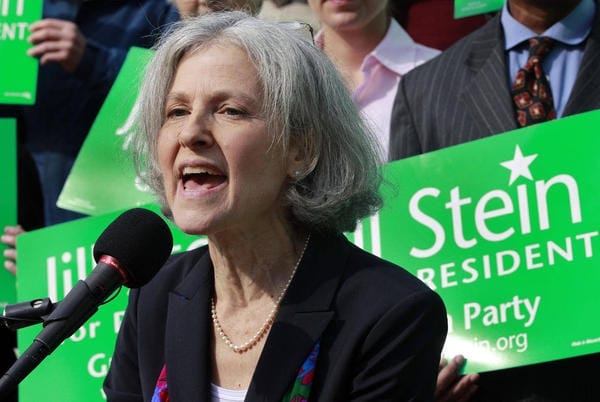Jill Stein Addresses Mainstream Debate's Sidelined Issues

Photo: JillStein.org

One of the enduring paradoxes of American politics is that, despite a campaign season that stretches nearly a year and gives candidates ample time to air their views, there are some issues that hardly ever get a moment in the spotlight.
Climate change is a prime example. In the first televised debate between Barack Obama and Mitt Romney, the words “climate change” and “global warming” were never mentioned.
Green Party presidential candidate Jill Stein addresses the mainstream parties' exclusion of these "outcasted" issues. The 67.2 million people who watched the last presidential debate heard very little about the drug war, immigration, same-sex marriage, corporate personhood, or the National Defense Authorization Act, to name just a few issues that were sidelined.
As little attention as these topics get, however, perhaps none are quite so neglected as the issue of electoral reform. Green Party presidential candidate Jill Stein is working to change that, by making democratic reform an integral part of the Green New Deal-- a four-part platform at the center of her campaign that also includes an economic bill of rights, sweeping financial reform, and a large-scale transition to a sustainable economy.
In Stein’s words:
“We won’t get those vital reforms without a fourth and final set of reforms to give us a real, functioning democracy. We don’t have that in America today.”
High on the Green Party's list of institutions in need of reform are the presidential debates themselves. The Commission on Presidential Debates-- a corporation created and jointly owned by Democratic and Republican Party leaders after a host of issues between them and the League of Women Voters in 1988-- has drawn criticism from organizations such as Open Debates for effectively excluding candidates outside those parties from the debates and for drastically limiting the terms of discussion.
As the Green Party platform points out, throughout American history, candidates outside the two-party establishment have introduced important ideas and needed reforms to the public’s attention, from the abolition of slavery and women’s suffrage to the eight-hour workday and African American civil rights.
When Greens, Libertarians, and other independent candidates are locked out of the debates, vital issues such as climate change and civil liberties too often get ignored.
In addition to advocating equal access to the debates for all qualified candidates, Jill Stein’s Green New Deal calls for a constitutional right to vote, abolition of the electoral college, an end to partisan oversight of elections, and mandatory use of audit-able, hand-counted paper ballots.
In the spirit of 2000 Green Party nominee Ralph Nader’s claim that “voter rights aren't worth as much without candidate's rights giving you more choice on the ballot,” Stein promises to remove onerous ballot access barriers to “restore the right to run for office and eliminate unopposed races.” She also supports statehood for the District of Columbia to give DC residents full representation in Congress and full powers of self-rule.
The corrupting influence of money in politics is a consistent theme in Green campaigns. As the Green Party platform states, “all Green candidates pledge not to accept corporate money for their campaigns,” a measure intended to ensure that they remain accountable only to voters, and not to deep-pocketed donors looking to buy access to power.
Jill Stein’s Green New Deal takes the same tack, pledging to “get the big money payoffs out of politics by implementing public funding of elections.” Stein supports reversal of the Citizens United decision that allowed unlimited corporate money in elections, through enactment of a constitutional amendment barring “corporate personhood” and affirming that money is not speech. She also favors equal and free access to the airways for all qualified candidates.
Green Party candidates like Jill Stein, as well as other candidates outside the two establishment parties, are frequently attacked as “spoilers,” yet Stein’s Green platform contains two elegant solutions to the so-called “spoiler” problem: instant runoff voting and proportional representation.
Instant runoff voting, used in cities including Minneapolis, San Francisco, and Portland, Maine, allows voters to rank their choices in single-winner races like mayoral elections. If your first-choice candidate places last, they are eliminated, and your vote transfers to your second-choice candidate. This process continues until one candidate has more than 50% of the vote. Instant runoff voting allows voters to vote for the candidate they agree with most without fear of inadvertently helping the candidate they least agree with, and it ensures that no candidate can win without majority support.
Proportional representation (PR) is used to elect legislatures in 80+ democratic countries around the world, including Finland, Costa Rica, Germany, Israel, Tunisia, South Korea, and New Zealand. In elections using PR, a party that earns 25% of the vote receives 25% of the seats in the legislature. This frees voters to vote for the party they most agree with, knowing that their vote will gain them representation in the halls of power, rather than feeling compelled to vote for the “lesser of two evils” as is too often the case in American elections.
Electoral reform, like climate change and other pressing issues, gets precious little attention from the carefully stage-managed debates or the mainstream media. Yet the very fact that so many important issues go ignored reveals the urgent necessity to open up the American political system to more voices and more choices. Jill Stein and other non-mainstream candidates are starting that badly-needed discussion about democratic reform, and showing American voters that a better way is indeed possible.




